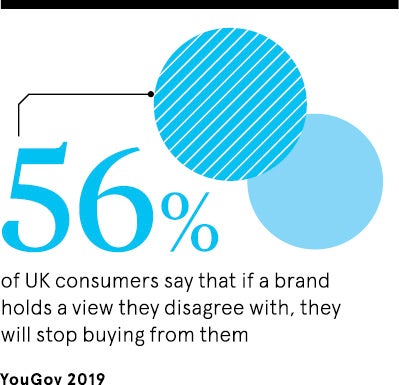The truth is difficult to take: most brands will disappear; they won’t impact millions and they won’t truthfully change anything. For some, notably Colgate, which was founded in 1806 and can be found in more than half of global households, longevity and brand loyalty are part of what defines them. But for every Coca-Cola or Apple, there will also be millions of short-lived ventures, very briefly on the money, but then forever forgotten.
For marketers, relevance – the assurance their work is resonating and the company has a place in the market – is absolutely critical. “Future-proofing a brand will be at the forefront of any client’s mind,” says brand strategist Rose Moncrieff. “Staying relevant is how a brand continues to exist; it’s the crux of longevity.” 
But relevance is hard to come by. In 2016, the Chartered Institute of Marketing found that only six out of ten marketers believe their brand is well aligned with the strategic direction of their organisation. For the other 40 per cent, work must feel like a strange intellectual chore: at once being charged with making sure your company’s output is relevant and knowing that in its current form, it is ineffective. How do experts in the field overcome this discrepancy?
Ms Moncrieff acknowledges this can be difficult and marketers have to be careful. “Over-promising at a time when consumers have the control is a big concern,” she says. “Backlash is often inevitable.”
Social media: empowering the consumer?
Patrick Herridge, co-founder of Social360, a social media monitoring company, expanded on the idea that the consumer was now the one in control of the marketing relationship. “In one sense, the consumer is the only stakeholder that matters to a brand – their loyalty and ongoing trust is what defines a brand’s success.”
Not only is their repeated consumption essential from a sales perspective, any branding missteps can now be exposed and amplified on digital platforms. Mr. Herridge explains “Social media has empowered consumers and given them a voice, making their advocacy a central part of marketing strategies and therefore brand longevity.” By amplifying consumer feedback, modern technologies have forced corporations to be more responsive and to focus their branding efforts on what actually resonates with their customer base.
Harnessing data to build consumer trust
Despite the manifold risks facing contemporary brands, businesses in general are relatively well regarded. The 2019 Edelman Trust Barometer revealed that both informed and general sections of the public were much more likely to trust businesses than government or media. In the supposed post-truth age, when nihilism can sometimes seem to pervade public life, such datapoints offer a rare opportunity for commercial organisations to build brand loyalty.
Over-promising at a time when consumers have the control is a big concern. Backlash is often inevitable
Reflecting on how the likes of John Lewis, IKEA and Marks & Spencer topped YouGov’s 2019 BrandIndex, Amelia Brophy, head of data products at the public opinion and data company, says: “The brands that have harnessed data and consumer insight to adapt to changing consumer desires are the brands which are the most successful and long standing. These brands usually have a long history embedded in Britain’s high street and collective consumer memory, have adapted their offerings to work online and have focused on the consumer experience.”
It seems obvious, but consumers are more likely to trust brands that pay attention to their needs and wants.
Brand loyalty requires authenticity over trends
In its 2020 Marketer’s Toolkit, leading advertising resource WARC found that 77 per cent of marketers believe brands need to take a stand on social issues. Indeed, 84 per cent of respondents to the WARC survey said conscious consumerism and sustainability would have significant or some impact on marketing strategy in 2020.
However, YouGov’s white paper on the Social Voice of Brands, published a few months earlier, showed that consumers are far more likely to want brands to communicate honestly, be trustworthy and act genuinely more than they want them to stand for something.
The difference between the two surveys is that WARC surveyed people working inside the industry whereas YouGov targeted the general population. While it is possible marketers are intrinsically aware that authenticity comes before any conscious consumerism, there is always the risk contemporary trends and new patterns of thinking are forced on to brands that would do better to avoid them.
The open-armed embracing of hot topics to the detriment of core values or business priorities can of course backfire miserably. Take the dot-com bubble, when many companies had “.com” at the end of their listed names so indiscriminate investors could punt on their having some intangible link to a web-based future.
A similar thing happened in 2017, when startups of all flavours pivoted to embrace the crypto-friendly suffix of blockchain to capitalise on post-fiat fiscal prospectors. It’s not likely that a similar crash will happen to environmental or social causes. But it is a reminder that trends often matter far more to those who are tasked with providing the analysis than to those whose wallets actually determine business success.
Listening to customers and adapting to their changing needs is a common theme behind establishing a strong brand. The world changes, but marketers can’t force that change. Despite the risks that come with an informed and vocal digital public, businesses benefit from being able to listen carefully and cater for the primary stakeholders: their customers.






